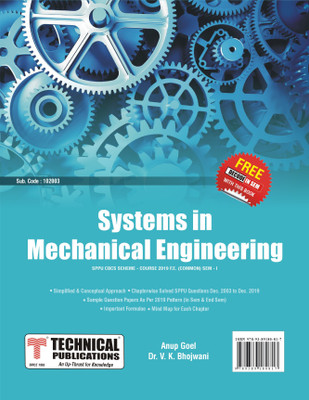Systems in Mechanical Engineering for SPPU 19 Course (FE - I - Common - 102003)(Paperback, Anup Goel, Dr. Virendra K. Bhojwani)
Quick Overview
Product Price Comparison
Unit I Introduction of energy sources & its conversion Energy sources : Thermal energy, Hydropower energy, Nuclear energy, Solar energy, Geothermal energy, Wind energy, Hydrogen energy, Biomass energy and Tidal energy. Grades of energy. (Numerical on efficiency calculation of thermal power plant ) Energy conversion devices : Introduction of pump, compressor, turbines, wind mills etc (Simple numerical on power and efficiency calculations) (Chapters - 1, 2) Unit II Introduction to Thermal Engineering Laws of thermodynamics, heat engine, heat pump, refrigerator (simple numerical) Modes of heat transfer : conduction, convection and radiation, FourierŌĆÖs law, NewtonŌĆÖs law of cooling, Stefan BoltzmannŌĆÖs law. (Simple numerical) Two stroke and Four stroke engines (Petrol, Diesel and CNG engines). Steam generators. (Chapters - 3, 4) Unit III Vehicles and their Specifications Classification of automobile. Vehicle specifications of two/three wheeler, light motor vehicles, trucks, buses and multi-axle vehicles. Engine components (Introduction). Study of engine specifications, comparison of specifications of vehicles. Introduction of electric and hybrid vehicles. cost analysis of the vehicle. (Chapter - 5) Unit IV Vehicle Systems Introduction of chassis layouts, steering system, suspension system, braking system, cooling system and fuel injection system and fuel supply system. Study of electric and hybrid vehicle systems. Study of power transmission system, clutch, gear box (Simple Numerical), propeller shaft, universal joint, differential gearbox and axles. Vehicle active and passive safety arrangements: seat, seat belts, airbags and antilock brake system. (Chapter - 6) Unit V Introduction to Manufacturing Conventional Manufacturing Processes : Casting, Forging, Metal forming (Drawing, Extrusion, etc.), Sheet metal working, Metal joining, etc. Unit VI Engineering Mechanisms and their Application in Domestic Appliances Introduction to Basic mechanisms and equipment.


